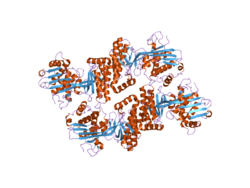Top Qs
Timeline
Chat
Perspective
Mevalonate kinase
Mammalian protein found in Homo sapiens From Wikipedia, the free encyclopedia
Remove ads
Mevalonate kinase is an enzyme (specifically a kinase) that in humans is encoded by the MVK gene.[6][7] Mevalonate kinases are found in a wide variety of organisms from bacteria to mammals. This enzyme catalyzes the following reaction:
.

Remove ads
Function
Mevalonate is a key intermediate, and mevalonate kinase a key early enzyme, in isoprenoid and sterol synthesis.[6] As the second enzyme in the Mevalonate pathway, it catalyzes the phosphorylation of Mevalonic acid to produce Mevalonate-5-phosphate.[8] A reduction in mevalonate kinase activity to around 5-10% of its typical value is associated with the mevalonate kinase deficiency (MVD) resulting in accumulation of intermediate mevalonic acid.[9]
 |
Remove ads
Clinical significance
Defects can be associated with hyperimmunoglobulinemia D with recurrent fever.[10]
Mevalonate kinase deficiency caused by mutation of this gene results in mevalonic aciduria, a disease characterized psychomotor retardation, failure to thrive, hepatosplenomegaly, anemia and recurrent febrile crises. Defects in this gene also cause hyperimmunoglobulinaemia D and periodic fever syndrome, a disorder characterized by recurrent episodes of fever associated with lymphadenopathy, arthralgia, gastrointestinal dismay and skin rash.[6] The symptoms of the disease typically start at infancy and may be additionally triggered by stress or bacterial infection. Children with mevalonate kinase deficiency may remain undiagnosed for a long time as there is not enough scientific data at the moment to accurately diagnose children with the disease.[9]
Remove ads
See also
References
Further reading
External links
Wikiwand - on
Seamless Wikipedia browsing. On steroids.
Remove ads







